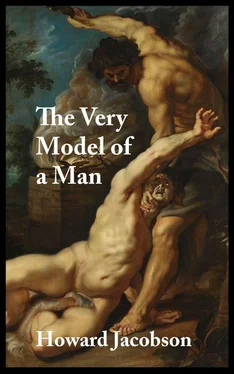… left to shift for herself and her little ones after her husband had been stoned to death by enthusiasts for gathering sticks on the Sabbath. Gathering sticks, my friends, in order to build a fire by which his wife and daughters might have warmed their shivering hands.
In the Torah this is adjudged a sin.
Now I must tell you that these maids were fair before their father’s murder, and that their mother had been comely. But now the three of them were bent like hags, their bones as dry as the firewood they’d been denied.
Despairing of change, the widow prayed for death. And death would surely have answered, had not a relative of one of the murderers, middlingly touched by guilt, offered her a corner of his least productive field. You and I, my friends, would not have attempted to grow a turnip in this wretched paddock; but any expectation is better than none, and thus, trusting to the God of Moses — the same God who has delivered us from the honey-pots of Egypt into the dry wells of Kadesh-Barnea — the widow put her wasted shoulder to the plough.
And had no sooner hitched her team than she was espied by Moses himself, out walking among his people early. ‘Thou shalt not plough,’ he told her, ‘with an ox and ass together.’
Obeying this statute, for she was as fearful as she was pious (a conjunction, gentlemen, upon which our leaders do not hesitate to prey), she set about sowing. Once again Moses happened to be taking the air. ‘Thou shalt not sow thy field with mingled seed,’ he reminded her.
The widow sowed as she was bid. On the appearance of the first juiceless fruits of her stunted field she raised her eyes from labour and saw…
Moses!
He was carrying an empty basket. ‘For you,’ he said, meekly.
Mistaking this meekness for magnanimity, as many of us have done since, the poor woman felt her face suffuse with gratitude. ‘For me?’ she cried. She could not remember how many years it had been since she had last received a gift.
‘For you, yes,’ said Moses, ‘in order that thou shalt not omit to take the first of the fruit of the earth, that the Lord thy God hath given thee, and shalt go unto the priest, and shalt give unto the priest…’
She did as she was told to do. Even had her piety deserted her, she would have obeyed; for she had seen what punishment is meted out to the impious.
When harvest time approached, she was dismayed but not surprised to find Moses, knee-high in grasses, in the field before her. ‘I came to see thee reap,’ he said, plucking slugs from his fringes, ‘for thou shalt not make clean riddance of the corners of thy field when thou reapest.’
‘But this field is itself a corner,’ she pleaded.
He closed his eyes, a man of God unwilling to behold the speciousness of the ungodly. ‘Neither shalt thou,’ he went on, ‘gather any gleanings of thy harvest. Those shalt thou leave unto the poor, and to the stranger.’
The distraught woman bowed her head, and did not say, ‘But Moses, I am the poor!’ Or, ‘Who is stranger, Moses, to good fortune, than my children?’
Her head was always bowed now. Her back permanently curved, like the crick in Aaron’s priestly rod.
As she prepared to thresh the grain, she knew by the creeping of the hairs upon her neck that Moses stood behind her with another statute.
‘And of the grain that thou separatest, thou shalt give unto —’
But she did not this time wait to be told unto whom. ‘No,’ she said. ‘I will not give a portion — I will give all. I am bled dry. You cannot squeeze more out of me. Tomorrow, if I can find a buyer, will I sell my field.’
With the little she received she bought a single ram — more miserable than herself. And to go with it, a single ewe — scrawnier even than her daughters. No sooner was the firstling of her sheep born than Aaron called on her in all the finery of his ephod — woven work around its collar, and upon the hem pomegranates of blue and purple and scarlet alternating with golden bells — a proper bridegroom, come to claim the flesh that was his due.
The moment she began to shear he was there again, his sacerdotal hand outstretched. ‘The first of your fleece,’ he demanded. And upon learning that the widow had decided she could do no better than slaughter her little flock, Aaron raced across the pastures to her, as fast as his ephod would permit him. ‘Mine, all mine… the shoulder, the two cheeks, and the maw.’
‘Since you persist,’ the woman cried, ‘I consecrate all that is left to the Lord.’
‘In which event,’ said Aaron through his sinuses, practising that high-toned nasality which has served him well in his capacity as holy spokesman for his slow-tongued brother, ‘the whole of the flesh of thy flock belongs to me. Everything devoted in Israel is mine. It shall then all be mine.’
And so saying — so intuning — he departed, bearing off with him, in strict accordance with Torah, the entirety of the poor widow’s meat, leaving her and her ailing orphans unprovided for, to forage or to perish as they pleased…
‘For these things, my brethren, I weep,’ wept Korah. ‘Mine eye, mine eye runneth with water to see that such things are, and are allowed to be, even now, even here in our deliverance, in the name of the God of Moses and his brother Aaron.’
‘On song,’ says Naaman approvingly. ‘On song tonight.’
Cain nods and thanks him. He finds talking to Naaman difficult, and accepting praise from him, if praise is the appropriate word, impossible.
Whatever the delicious joke is, the after- or foretaste of which always sits like a winking pearl of dew on Naaman’s womanly lips, Cain knows that he is doomed never to get it. Sometimes the joke he doesn’t get is attributed to himself, as when Naaman says, ‘I think you may have been a little dry, perhaps a little too tart, even for me, this evening.’ Or, ‘Wicked, quite wicked of you. I had to chew on my sleeve to silence my guffaws.’ And then Cain is left to puzzle over his narrative, wondering which grave episode this time has struck the senior dignitary’s funny-bone.
Tonight, Naaman would have addressed himself at length to ‘those two quite delicious angels… a species of being never witnessed, I believe, though much spoken of, in Babel… what names did you give to them again?’ — but the weight of his daughter on his arm shortens his appreciation. ‘I do not know,’ he says instead, ‘whether you have met my…’
Cain inclines his head. He has not met Zilpah, but he has been observing her observing him in public places, in parks, on the streets, around theatres, ever since his arrival in the city. It could almost be said that although he hasn’t met her he has talked to her, for she regularly, no, she religiously attends his recitals, and so startles him by the solemnity of her concentration, that many of the things he says have her, so to speak, as their object. She would appear to wish to see further into his soul than he sees himself; so he is at pains to show that he has nothing to conceal, that he is built of hollow tubes through which anyone may peer.
Given his usual complaint against audiences in Babel — that they are embarrassed into laughter by whatever is not moderate — you would think Cain would be grateful for Zilpah’s sorrowing demeanour. But he doesn’t like her. Although he hasn’t met her, he knows he doesn’t like her. It may be a fact that her omnipresence has been troublesome enough to interest him, but her appearance is definitely not interesting enough to trouble him. She is too unprotected for his taste, her face too exposed, her skeleton somehow too deducible. When she turns from him he can count her vertebrae like buttons through her gown. When she sits listening to him talk, following his vision as though the iris that floats in the humour of his eye is floating in the fluid of hers too, he believes he can see the fibrous cords and papillary muscles of her heart.
Читать дальше











